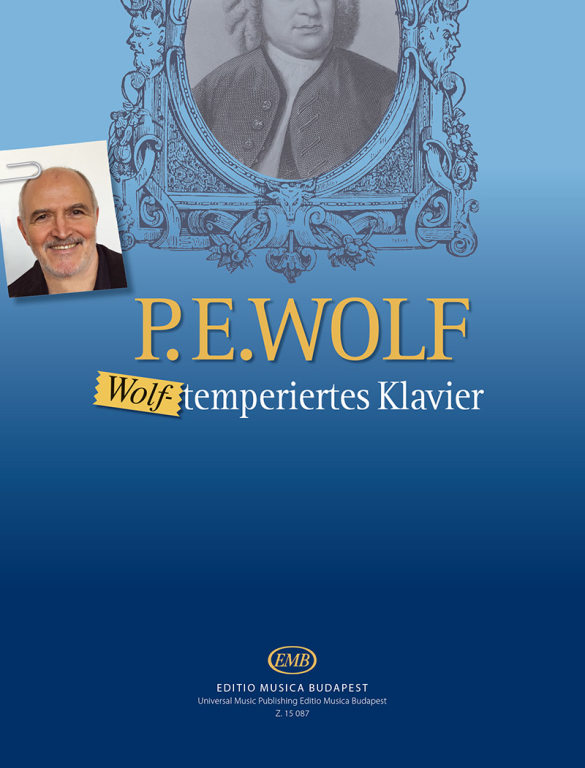Announcing the release of Péter Wolf's Wolf-temperiertes Klavier
 The model for the Wolf-temperiertes Klavier, as the title might suggest, is Johann Sebastian Bach’s keyboard cycle Das Wohltemperirte Clavier. In line with this, Péter Wolf’s collection of 24 piano pieces uses each of the twelve notes of the octave from C to B as home keys (both major and minor) for the movements. It differs from the Bach work in having no fugues, only freely composed praeludia, or as Chopin would have called them, preludes. Péter Wolf is more strongly linked to Chopin and the Romantic and twentieth-century prelude tradition he engendered than directly to Bach, insofar as etude-like virtuoso movements are interspersed with meditative, sentimental pieces in a series that takes us through the world of 24 keys, and the piano technique required is closer to the age of Romanticism than to the Baroque.
The model for the Wolf-temperiertes Klavier, as the title might suggest, is Johann Sebastian Bach’s keyboard cycle Das Wohltemperirte Clavier. In line with this, Péter Wolf’s collection of 24 piano pieces uses each of the twelve notes of the octave from C to B as home keys (both major and minor) for the movements. It differs from the Bach work in having no fugues, only freely composed praeludia, or as Chopin would have called them, preludes. Péter Wolf is more strongly linked to Chopin and the Romantic and twentieth-century prelude tradition he engendered than directly to Bach, insofar as etude-like virtuoso movements are interspersed with meditative, sentimental pieces in a series that takes us through the world of 24 keys, and the piano technique required is closer to the age of Romanticism than to the Baroque.
Listen to: Adagio in E by Péter Wolf, played by József Balog (excerpt)
The score can be ordered here.
Péter Wolf writes what he hears and feels, and this fundamental attitude determines all of his pieces, regardless of what genre he happens to be composing in. And his oeuvre is highly varied. He set out as a pianist, and was admitted to the choral conducting programme at the Budapest Liszt Academy, but instead he studied jazz piano, meanwhile he drifted along with the current of music life, mainly popular music: he played in bands, supplied backing vocals, saved sound recordings, and was an understudy pianist. He composed hit songs, hit film music, made countless arrangements (through the Franz Liszt Chamber Orchestra he came across Isaac Stern, for whom he made arrangements of an entire CD’s worth released on the Sony label in 1998) and wrote much “classical” music too: piano pieces, orchestral works, concertos, and so forth. In 2017 he was awarded the Artisjus Prize for Artist’s Lifework in Popular Music.
His music makes intensive use of almost everything that can be used in a given context, be it from the classical tradition, jazz, or pop music. In this regard we might consider him postmodern, yet there’s something that distinguishes him from the post-war postmoderns. The latter indulged in unbridled cannibalization of anything from the musical past (and their contemporary present), but always did so with ambiguous, guileful irony: the quotation was never in doubt, but its meaning and aesthetic judgement was. Péter Wolf’s post-postmodern music never uses “quotation marks”; this music takes itself seriously in the most classical sense of the word. If he gives a nod to Debussy or Chopin in the 24 piano pieces (just to mention two composers whose figures loom large at several levels), he happily immerses himself in the given musical world, and behind his playing with styles one always senses a deep reverence for the composer referred to. And the movements inspired by popular music, brimming over with emotion, are also free from irony. Péter Wolf firmly believes that music is to be heard, and expresses feelings, and as he is a sincere artist not prepared to comply with external expectations, he follows only his own nose (or ears, or heart); his music too, with untrammelled homeliness, wallows in the musical styles of past centuries and current times.
Péter Wolf’s deft hand not only guides us steadily through a kaleidoscopic cascade of styles, but also vouches for the extraordinarily colourful pianism, and at times dazzling virtuosity, which is at least as important a feature of the Wolf-temperiertes Klavier as the musical ideas themselves. The piano textures of Chopin and Debussy, along with Gershwin’s pianistic ideas, must have been key impulses when the pieces were written, but the true source of inspiration was in all likelihood József Balog, who first played and recorded the works. (Gergely Fazekas)











